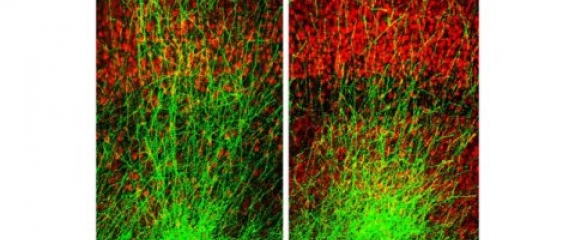Scientists eliminate core symptom of schizophrenia in mice

Researchers have successfully disrupted a genetic chain of events in a mouse model of schizophrenia and reversed memory deficits, one of the disorder's most difficult-to-treat symptoms. This discovery--which builds upon decades of early-stage research--could lead to more effective therapies for the cognitive symptoms of schizophrenia, a psychiatric disorder that affects more than 21 million people worldwide.
In a paper published today in the journal Neuron, scientists at Columbia's Mortimer B. Zuckerman Mind Brain Behavior Institute, Columbia University Medical Center (CUMC) and the New York State Psychiatric Institute (NYSPI) used a chemical compound to regrow connections between brain cells, or neurons, which in turn restored memory deficits. The abnormal or stunted growth of neurons in the brain's memory centers is a key indicator of schizophrenia.
The study was performed in mice with a specific genetic mutation known as the 22q11.2 microdeletion. This mutation, which occurs in one percent of people with schizophrenia, is the single largest genetic risk factor for the disease.
"With these findings, we showed that restoring cellular connections reversed memory deficits--a symptom of schizophrenia for which there is no effective treatment," said Joseph Gogos, MD, PhD, a principal investigator at the Zuckerman Institute, professor of physiology and neuroscience at CUMC and a senior author of the paper. "This represents an invaluable new strategy for treating schizophrenia and highlights the critical importance of basic biological research in psychiatric disorders. Understanding how schizophrenia originates in our model lends critical insight into the disorder as a whole, paving the way for improved treatment options that have thus far remained elusive."


